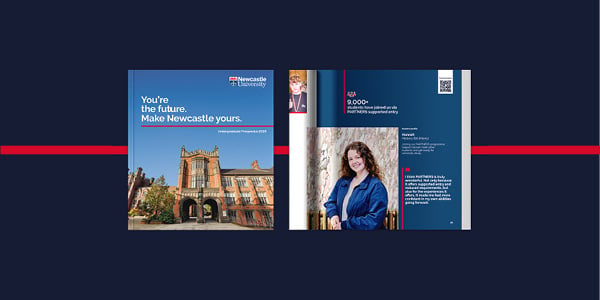Applying to uni in 2025 | How to write your personal statement
28 February 2025 | By: Jenny Shippen | 3 min read
Writing an eye-catching personal statement could be the very thing that earns you a place at your favourite university to study your dream degree.
But with so much information out there on how to write a personal statement, how can you tell what the best advice is? Follow our step-by-step guide to crafting a captivating personal statement.
Contents:
- What is a personal statement?
- 2025 entry: planning your personal statement
- Structuring your personal statement
- Editing and proofreading
- Personal statement dos and don’ts
- Tips for international students
- Personal statement deadlines
What is a personal statement?
Your personal statement is a piece of writing that’s personal to you. It forms part of your UCAS application.
It's also your chance to communicate your passion for your chosen degree to university admissions staff and showcase your ambitions, skills and experience in your own words.
If you're applying to go to university this year, your personal statement will take the form of an essay.
If you want to go to university in 2026, your personal statement will be made up of three separate questions.
This blog deals with the essay format for 2025 entry. More information about the new personal statement for 2026 entry is available here.
2025 entry: planning your personal statement
The planning stage can be as rough as you need it to be. Try to get as many points down as possible, including:
- why you want to go to university
- why you want to study the degree you’re applying for
- how your studies relate to your chosen degree or, if they don't, why you’re applying for something you haven’t studied before
- how you exhibit the qualities and skills your chosen universities are looking for
- how your application is supported through work experience, placements or volunteering
- your hobbies and achievements, and how they showcase your strengths and suitability for your chosen degree
- your future plans - what you want to do after university and how your degree could help you achieve this
Structuring your personal statement
Breaking down your statement into smaller, more manageable chunks, can make writing it easier. Here’s how:
The beginning: make your introduction memorable. Get to the point quickly to show the university admissions staff you are focused and knowledgeable about the subject you're applying for.
Communicate your excitement, enthusiasm, and motivation to succeed. Draw the reader in, but don’t be tempted to rely on gimmicks or puns. Don’t just say you find the course interesting – explain why you find it interesting.
Write what comes naturally, and use personal examples to demonstrate your commitment to study. If your personal tone of voice starts to filter through, that’s a good thing (as long as you don’t stray from the point you’re making!)
The middle: this is where you flesh out your suitability and experience. Make sure you’ve included a good balance of academic and interpersonal skills, including the transferable skills an admissions tutor might be looking for.
Always back up each skill with a practical example of how you’ve applied it in the real world.
Linking your hobbies and interests to your chosen degree will also demonstrate your strengths and abilities, as well as show you’re a well-rounded person who isn’t afraid to get involved.
The ending: revisit the key points you want the admissions tutor to remember the most. Summarise your passion, suitability, and motivations and how all this experience makes you a great candidate for the course.
Include a few words about how the university experience will help you develop as a person, such as building your confidence when meeting new people, or living and learning independently.
Finally, make your ending forward-looking, dynamic, and optimistic. You don’t need to plan out the next 20 years of your life but try to show how your chosen course ties into your future career plans.
Editing and proofreading
Once you’ve edited your statement to the correct length - you're allowed just 4,000 characters - you need to proofread it. Try these techniques:
- read what you’ve written out loud, slowly
- print out a copy – sometimes it’s easier to edit on paper rather than via a screen
- try reading your personal statement backwards to notice each word individually
- change the font or size of your text to see your personal statement in a new light
- make one read-through just for punctuation, particularly missing full stops, upper and lower-case text, and apostrophes
- ask a parent, sibling, or friend to read your personal statement to check for spelling mistakes or typos

Personal statement dos and don’ts
Let’s take a look at some of the basic personal statement dos and don’ts.
Do:
- write in clear paragraphs, avoiding flowery language
- be truthful
- relate your strengths, experience and achievements to the course you’re interested in
- follow our steps to plan, structure, and check your statement
Don’t:
- exceed 4,000 characters (including spaces)
- leave writing your statement until the last minute
- repeat information that’s included elsewhere in your application
- share your statement or copy someone else’s – UCAS uses software to check for similarities with previous statements; any similarity greater than 30% is flagged and the university you have applied to will be alerted
- use AI to generate all or part of your personal statement - for more detailed information, check out our blog on whether using AI is cheating.
Tips for international students
If you're an international student preparing to write your personal statement, there are a few extra things you should keep in mind:
- explain why you want to study in the UK; show you have thought about your decision to study abroad and that you are ready to take this step.
- explain why a UK university is the right choice for you and fits your career dreams.
- show you have the required level of English language proficiency - and remember to include details of any tests or qualifications you hold as part of your application
Personal statement deadlines
The deadlines for submitting your application - including your completed personal statement - to UCAS are:
- Tuesday 15 October 2024 (6pm) - if you’re applying for a medicine, veterinary medicine/science or dentistry degree
- Wednesday 29 January 2025 (6pm) - for the majority of other degree programmes
Make sure you factor in plenty of time to make any last-minute changes; you don’t want to panic and rush the final stage of your application.
And there you have it - how to write a personal statement for university, in one easy-to-follow blog post.
For more advice, download your
personal statement guide for 2025 entry

Discover the Newcastle experience: Our Undergraduate prospectus will guide you through our world-class degrees, the support you can benefit from, and our beautiful city-centre campus.


